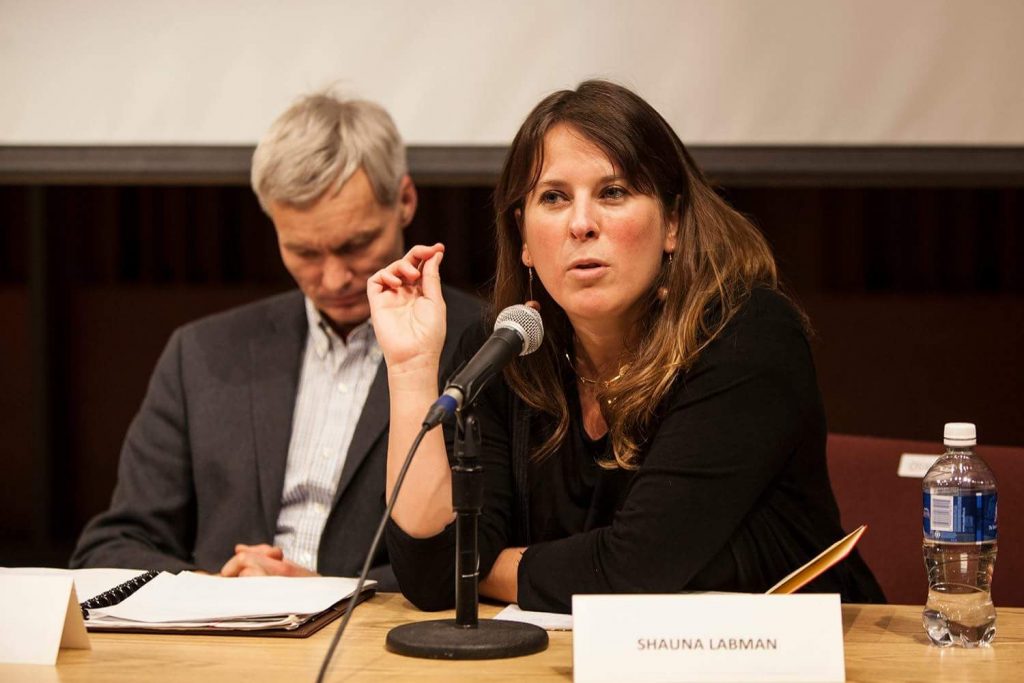- Fall Newsletter, 2025, Issue 15
- Using International Online Learning Modules to Engage Students in the Study of Critical Global Issues
- Upcoming Book Launch: Hearts of Freedom
- Announcing winners of the 2025 CARFMS Essay Contest
- The New York Declaration for Refugees and Migrants and its two Global Compacts: Addressing the Symptoms or the “Root Causes” of Forced Displacement?*
Interview for ‘Notes from the Field’: Shauna Labman, by Kate Motluk

Interview with Dr. Shauna Labman, February 23rd, 2018, by Kate Motluk
Dr. Labman shared her thoughts on the role of interdisciplinary study, ‘layered legality’, and Canada’s legal obligation to refugees and asylum seekers.
Dr. Shauna Labman is a law professor at the University of Manitoba and an advocate for refugee protection.
Kate Motluk works with the Refugee Sponsorship Support Program and was previously a program coordinator with Lifeline Syria.
Across the globe, forced migration is at an all-time high, with record numbers of refugees and internally displaced peoples scattered by war and persecution. Although the scale of global displacement shocks but does not surprise practitioners and researchers, it has caused a surge in human interest amongst the Canadian public. ‘It’s really hard to actually get research done,’ Shauna says with a slight laugh, before launching into an impressive list of tasks keeping her busy. In addition to teaching and researching, Shauna has had an increase in media calls, media clarifications, community talks, myth-busting with NGOs, and even participated in a video as part of an exhibit “Seeking Safety” at the Canadian Museum for Human Rights in Winnipeg.
These activities do not seem to be impeding Shauna’s research efforts. She is currently engaged in multiple research projects. Amongst her commitments, Shauna is on the roster of a multilayered research project with Audrey Macklin on creating citizenship through private sponsorship. Shauna is also involved in a collaborative project with a University of Manitoba colleague in Education, Jerome Cranston on Syrian parents and their experiences with the Canadian schooling system as well as other developing projects on the secondary migration of refugees and durable solutions to forced migration.
Shauna’s research practice is highly interdisciplinary and collaborative. As a lawyer, her role is often understanding and clarifying the law that is at the heart of the research. Within the field of forced migration, Shauna finds that the value of interdisciplinary is self-evident. ‘So many of the questions being asked are really not necessarily about the law, but the consequences of the law. So I can’t necessarily answer them alone as a legal scholar.’ She describes her role as often ‘understanding how all of this fits into the law and obligations that we want to hold on to, to advocate for, and then looking at the other side of that, which is the laws that are arguably problematic and we want to challenge, like the Safe Third Country Agreement and Designated Foreign Nationals.’
A key focus for Shauna is Canada’s Private Sponsorship Program. She underscores that while the program is ‘wonderful, and doing amazing work,’ it is something that Canada is doing voluntarily. The private sponsorship program helps to bring many vulnerable individuals to Canada, but it is not addressing Canada’s legal obligation of refugee protection. By virtue of being a voluntary program and not rooted in international law, Shauna argues that it is highly susceptible to changes in government priorities.
Another focus of her scholarly work has been irregular arrivals and what she terms ‘layered legality’: ‘There’s almost this public misunderstanding of the border as the singular line of the law. How people cross the border defines their legality or their legitimacy, their belonging or lack of belonging here in Canada. And when you actually look at the law associated with refugees, you have multiple laws at play in very different ways.’ This, again, causes Shauna to return to a multi-scalar investigation of Canada’s legal obligations. ‘If someone comes and claims asylum, we need to determine if they meet that refugee definition’ which Shauna posits is often lost or sacrificed to the incorrect idea that people break the law when crossing the border without authorization.
In an upcoming paper with Jamie Liew, an Associate Professor in the Faculty of Law at the University of Ottawa, Shauna expands on this idea by looking at ‘all the levels of the law that play out on asylum seekers, refugee claimants, as they cross into Canada, how they cross into Canada, the Safe Third Country Agreement, irregular arrivals, so the sort of tiered parameters that were created through the Balanced Refugee Reform Act and so forth.’
When asked what is one thing Shauna would like to see changed in how refugees are treated in Canada she answered ‘I would take out the words illegal and bogus’.
As for advice to those finishing their undergraduate degrees, Shauna recommends to ‘follow your passions, because you’re going to work really hard on what you do so you may as well do what you care about most.’
Notes from the Field
CARFMS Notes from the Field is based on a conversation between an undergraduate student finishing their degree or a postgraduate student starting off their degree, and a more established researcher in refugee and forced migration studies. While all Notes will be different, the unifying thread connecting them is a focus on recent developments in research, law, policy, and approaches within Canada to issues of asylum, borders, and immigration. Each student will also find out if the researcher has advice to dispense to scholars at the end of undergraduate studies, and if there is one key change that we should be making about how refugees are treated in Canada. At the end of the initial run of Notes, will publish this advice together as a guide and inspiration.
If you would like to participate as either an interviewer or interviewee, please contact Dr. Stephanie J. Silverman at sj.silverman@gmail.com or @DrSJSilverman
Advice, support, and editing will be made available, so don’t be nervous!

